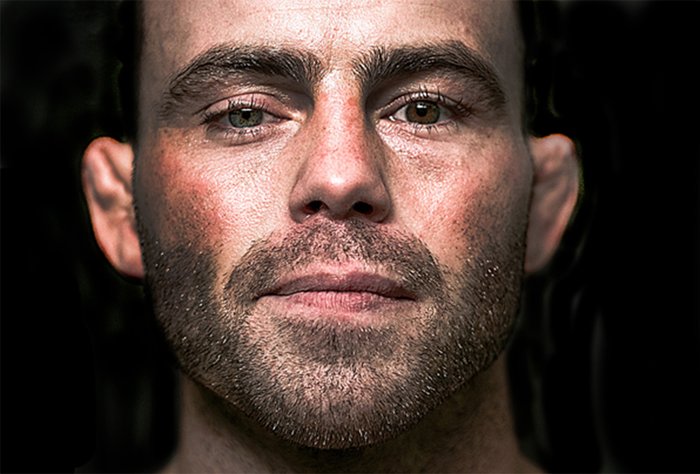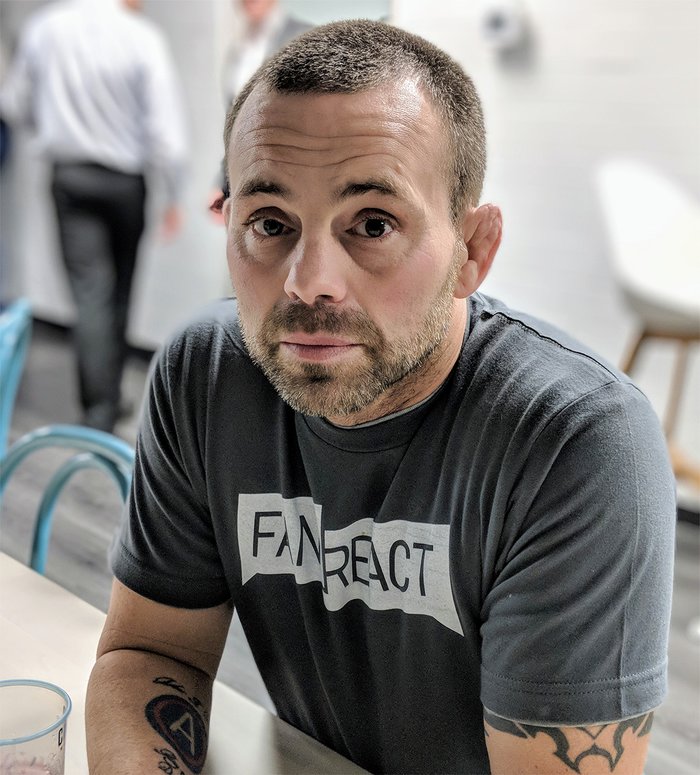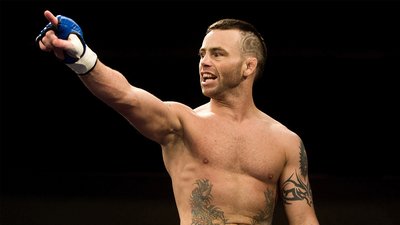I didn't know if ex-UFC world champion Jens "Little Evil" Pulver would remember me as well as I remember him. Memory is short when you're at the top, long when you're at the bottom, and I was at a low point when I co-produced the documentary film, "Jens Pulver: Driven" in 2010. At the time, Pulver was training to reclaim his championship belt, and I felt like just another guy in his periphery with a notepad or camera, traipsing after sound bites.
Eight years later, after surviving a divorce, taking financial hits, getting sober by doing two-a-days in a cinderblock gym—I'm talking about myself, here, not Pulver—I get him on the phone and he reminds me that all memory, whether we won or lost, is colored by the hits we took along the way, and by the people who recognized that we'd been hit and stood by us anyway.
Which is to say that Jens Pulver does remember me, he says, and I should not have been surprised. I saw Pulver get hit, and Pulver saw me see him, and this is how it feels to be a Jens Pulver fan: You're cageside to real life, that close to greatness but also to loss, and everything you think about the world is unfolding in that cage, and it's looking right back at you, saying, "Don't give up" or "This is who we are" or "If I can take it, you can, too."
The Gym Was Home
You don't love Jens Pulver because he's a superstar, you love him because he's not. Because he fought in the day when millionaires weren't made in a single night and cage fighting, back when Pulver began his career in 1999, wasn't even legal in many states. Old-school fighters like Pulver were tussling for something bigger than fame.
"When I first started, it wasn't about the money," Pulver tells me, his voice like a soldier's thinking back on a long line of bodies, some of which look just like his own. "The whole thing was about changing my name, getting out from under my past."
Pulver initially fought for videotape alone, then a few hundred dollars came his way, and then a few thousand per fight. When the first lightweight division opened up in the UFC, Pulver was its first world champion. But his career might have been solely an effort to step out from the murky shadow of a father who vigorously abused him throughout his childhood.
Pulver is at peace with that now, but at the time of his rise to world champion, the title belt was a big "eff you" to a life of doubt and suffering—or so he thought.
Pulver had summited the roughest, most physical sport on the planet, but the top of the mountain was even more isolating than the bottom, he says. Having been raised to see failure—not winning—as second nature, the UFC kingship was dizzyingly uncomfortable.
"I didn't like it up there, everybody pointing and looking at me—that didn't help my anxiety for shit," Pulver says.
His title reign was short-lived, as he succumbed to depression and self-sabotage, leading to loss after loss.
What got his mind right was falling back on the training, trusting in what had always helped. When everything else felt like an avalanche plummeting toward him, the gym was the only home he could return to.
Hope, Drive, and Faith
From the days when Pulver was a high school and college wrestler, to the period when he put in work under legendry MMA trainer Bob Shamrock, throughout his close to 50 professional fights, and into that proverbial retired fighter's twilight of old t-shirts, fewer hangers-on, and dimly lit locker rooms now echoing with only one or two lockers slamming shut, athletics alone, Pulver says, is what kept him out of jail.
The sporting world gave Jens Pulver hope, drive, and something akin to faith.

"Running, especially, has always been therapeutic for me," Pulver tells me. "It's always been my hour and a half rehab every day, my session with my pastor. When I'm out there, I'm free."
When the Animal Has Left
Even now, firmly out of the fight game, Pulver continues to run every day, doing 10Ks and half-marathons to put his cardio, and depression, on blast. His gym routine is full body, four days a week. He begins with full-range squats—first with an overhead PVC pipe and then building up to 225—then does 3-4 sets of straight-legged deadlifts before hitting the dumbbells for his shoulders and pecs.
He eats clean, consuming only fruits, water, and coffee before noon. Later in the day he switches to greens, and for his heavier meals, consumes fish, chicken, and a variety of heavily-spiced pork dishes.
He avoids processed foods and drinking too much water, referring to a half gallon a day as "the sweet spot—just enough so that I hydrate but don't have to pee every five minutes."
What he also avoids, out of love for his wife and two children, is training like a fighter again. He doesn't want to trick himself into coming out of retirement, knowing that his body, having crested 40, has aged itself out of professional combat.
"I can bounce around and I can shadow box," he tells me, "and I don't mind hitting the heavy bag a little bit. But, I want to make sure I'm far enough away from the sport, from the pain of having to be done with it, so that I don't tell myself I can still compete."
He's briefly reflective, the silence like a decade passing by in one or two breaths, before he adds: "Because I can't. That animal is gone."
Body, Mind, and Spirit
Stepping away has been an exercise in discipline for Pulver, with so many reminders of his past life—people still doing articles, or Pulver hearing his name mentioned in fight broadcasts, which happens a lot.
Even harder, I suggest, is that he's constantly reminded of how great he once was, instead of is.
However, that Pulver is, by his own account, popular but not famous seems to have allowed for a healthy way out of the fight game. Without overwhelming fame, Pulver is free to reinvent himself as a citizen, running just to keep his mind straight, and hitting the weights so he doesn't age out of more than just combat but out of life itself, he says.
"When I had fights lined up, I'd train because I was in a training camp," Pulver tells me. "But then I'd binge. Now, the training camp has to last a lifetime. Now, it's about forever. Body, mind, spirit—you've got to build it all."
And with no cameras around, he can sometimes fail but not feel like a failure. He can lose a few personal battles without feeling like a loser. The sum total is more important.
"There are days when I do not want to wake up," Pulver says. "There are days when I do not feel like I belong."
And then there are days, he tells me, when putting in the grind is worth every effort. Over the long haul, he sees the physical and mental transformation as an added value to the people around him, too—to his wife and kids, and to his fans, who have never really waned in their support.

Now, instead of just signing autographs, Pulver trades on his popularity through involvement with anti-bullying efforts, programs for battered women and children, and campaigns for anxiety and depression awareness—topics that are close to his heart, having battled them brutally and survived. He fights for the underdogs, as always.
And sometimes, Pulver still fights for himself, venturing into that crowded arena of the business world now, where the stands of nameless faces, once again, can be overwhelming.
Pulver ran a gym and clothing brand for a while, dabbled in coaching, appeared in numerous television and film works, and had his likeness featured in the popular Supremacy MMA video game. But nothing made him feel at home outside of combat, until recently.
The Do-Over
Now, Pulver has a new manager, a new inner circle, and a fresh rebranding push into the multi-billion-dollar gaming space as a Twitch personality and for-profit gamer, working his way toward six-figure purses at events like TwitchCon in Los Angeles this past October.
He's more focused these days, fighting for his living in a manner that's more tactical than before. But his new coaches—the entrepreneurs mentoring him—have helped him to see that the rigor of proper training, no matter what the discipline, is often the same.
"I used to think I couldn't be in the business world, that I couldn't relate to these people, that I'm just a dumb fighter," Pulver tells me. "Then I realized, I'm just like them."
He talks to me about the habits of his business coaches: their single-mindedness and passion for success, the discipline they hone day after day, training themselves to make bold but savvy moves without blinking. He likens the sheer willpower it takes to close a deal to winning a title in combat sports.
When I ask how he sees everything ending—the big-picture question—Pulver tells me: "There is no ending except the day I'm six feet under. But I'm happy now, and I wasn't before."
In some ways, I think that Pulver is getting a "do-over" on his life as a kid, only nobody's kicking his ass this time around, and the house is nice, and the home is built on love. Jens Pulver, like so many of us, is making up for his old family by crafting a new one.
The locker rooms might be dim now, but he likes them that way—far from the spotlight and the noise. There is no mountaintop; there is only this.
And we're right there watching it play out again, cageside to Pulver, which is cageside to ourselves.
Which is what we remember when we remember Jens Pulver.



